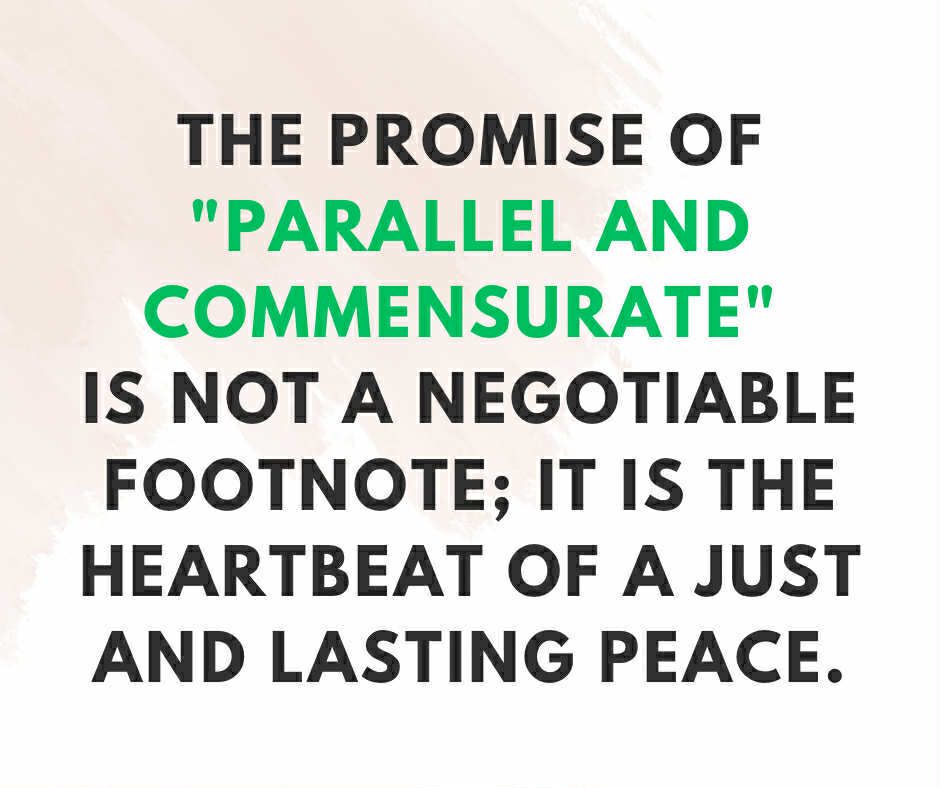
The Foundation of Trust: Why “Parallel and Commensurate” is Non-Negotiable

In the pursuit of peace, certain phrases carry the weight of entire generations’ aspirations. In the peace process between the Government of the Philippines (GPH) and the Moro Islamic Liberation Front (MILF), one such phrase is “parallel and commensurate.” It is more than mere legal jargon; it is the very bedrock of the trust upon which the entire Comprehensive Agreement on the Bangsamoro (CAB) is built. To understand its significance is to grasp the fragile architecture of the peace it seeks to secure.
The term “parallel and commensurate” mandates a synchronized, two-way street toward normalization. On one track, the MILF commits to a progressive, phased decommissioning of its armed forces and weapons which include other seven (7) elements or deliverables namely, constitution of the joint normalization mechanisms, confidence-building measures, socioeconomic interventions, transitional justice and reconciliation (TJR), disbandment of private armed groups, policing, and redeployment of government troops.
This is an act of profound trust, a symbolic laying down of the arms that have defined their struggle for decades. It is a sacrifice of the tangible tools of their cause for the intangible promise of self-governance. But this immense step is not to be taken in a vacuum. It must unfold on a timeline that is “parallel and commensurate” to the other track: the GPH’s fulfillment of its commitments. This includes the full implementation of the Bangsamoro Organic Law (BOL), the establishment of a functional and fiscally autonomous Bangsamoro government, and the delivery of socio-economic programs that address the historical injustices and marginalization of the Bangsamoro people.
The genius of this parallel and commensurate approach lies in its creation of mutual accountability. It prevents either party from unilaterally seizing the gains of peace while forcing the other to bear the full weight of the sacrifices. A complete decommissioning by the MILF without the corresponding, full devolution of political and fiscal power would render the entire process meaningless and leave the Bangsamoro people vulnerable.
Conversely, the successful establishment of a new political entity would be unstable without the concurrent dismantling of the armed component that gave rise to the demand for it. It is a balancing act, a dance of reciprocal steps where progress on one side is a prerequisite for progress on the other.
To renege on this aspect, particularly for the GPH, would be to unravel the very foundation of the agreement. It would not merely be a policy reversal; it would be a profound betrayal of trust. For the MILF, who have traded their weapons for the promise of a peaceful, political path forward, a breach of this principle would signal that their sacrifice was for naught.
It would validate the very fears that have fueled decades of conflict—the fear of a hollow promise, of a government that negotiates in bad faith, and of a peace that is more of a capitulation than a genuine compact. Such an act would not only threaten the gains of the peace process but could also reignite old grievances and undermine the legitimacy of the Bangsamoro government in the eyes of its people, potentially leading to instability.
The promise of “parallel and commensurate” is not a negotiable footnote; it is the heartbeat of a just and lasting peace. To break it is to risk returning to a past that both sides have worked so hard to leave behind. Allah knows best. (Note: This article is shared by BMN/BangsamoroToday with the author’s permission, Abdullah P. Salik, Jr.)

